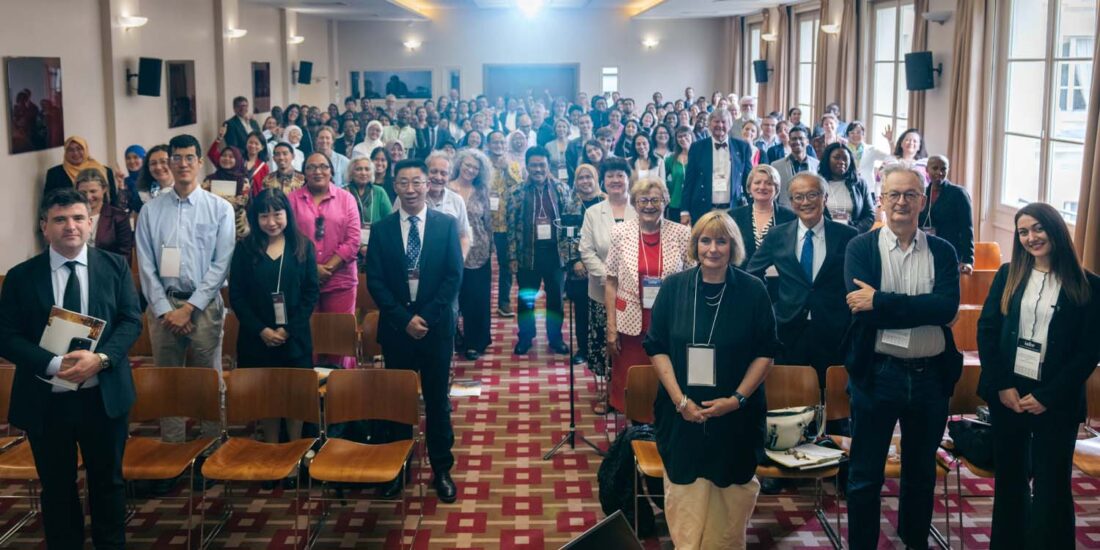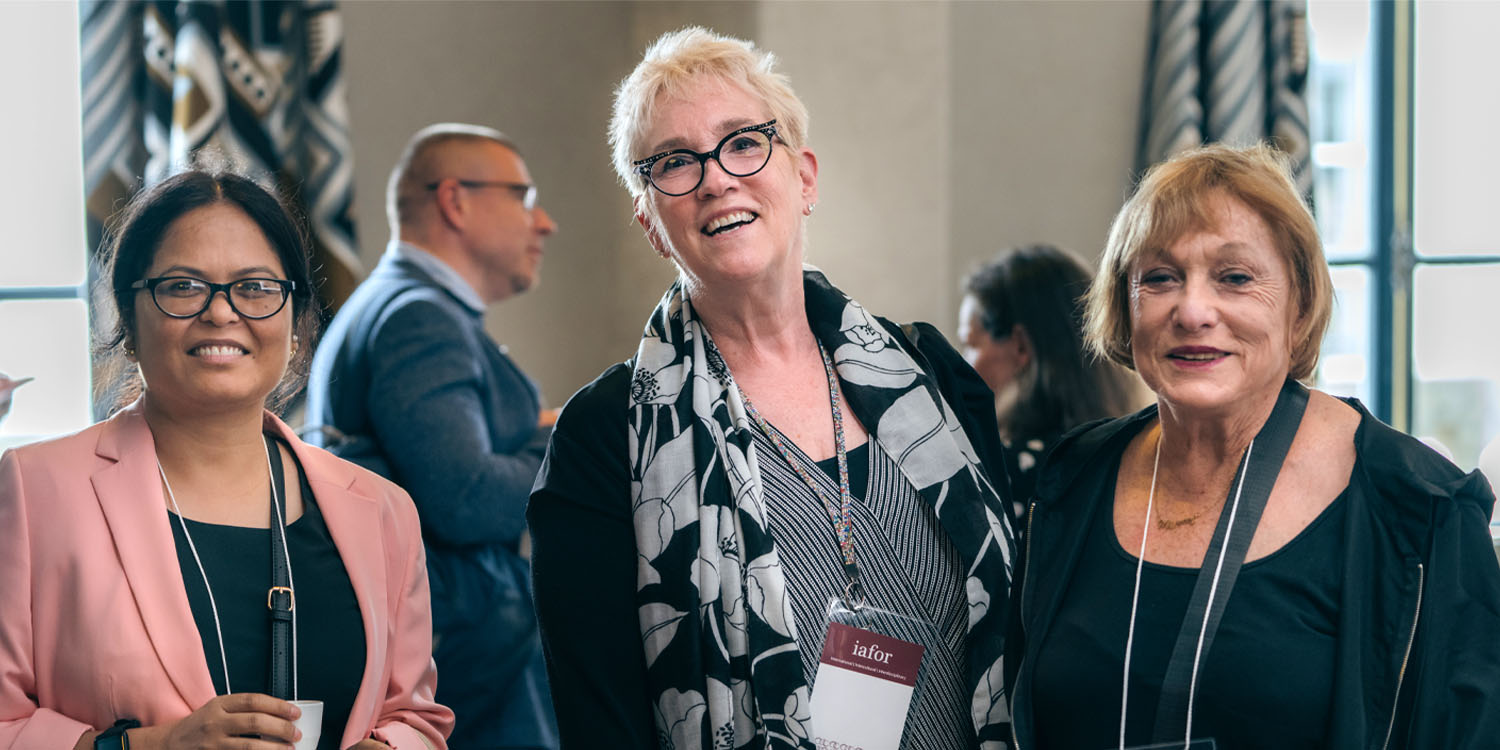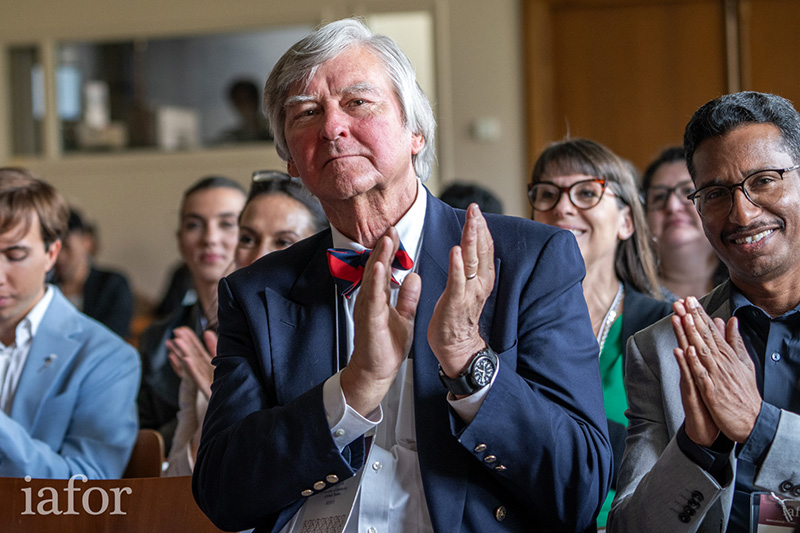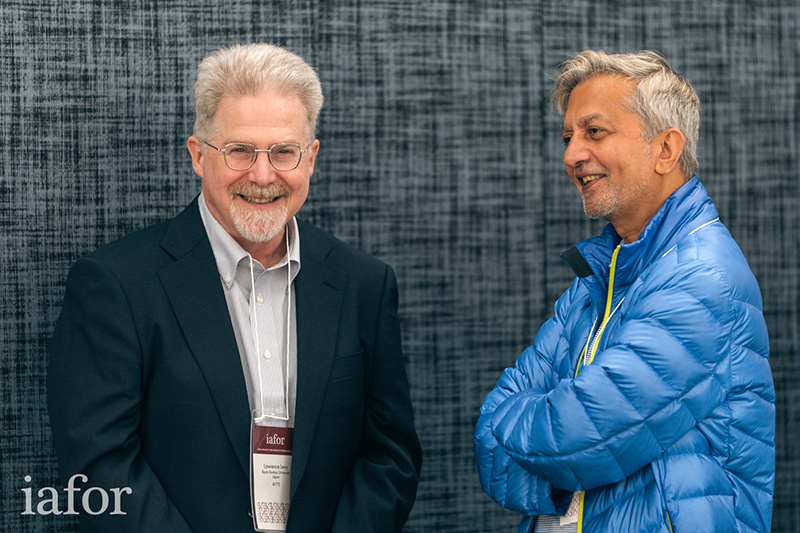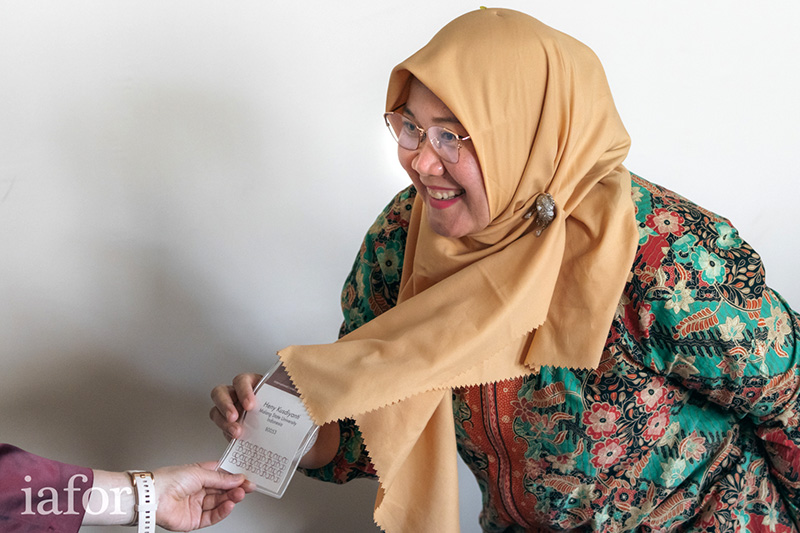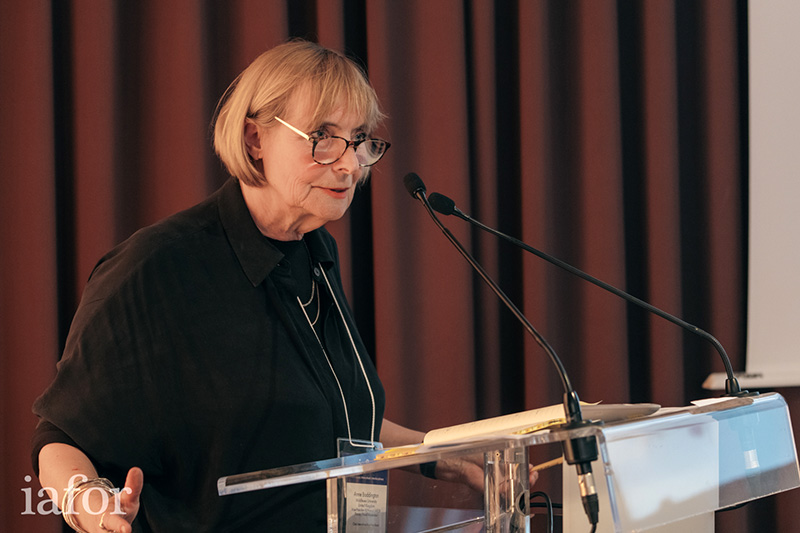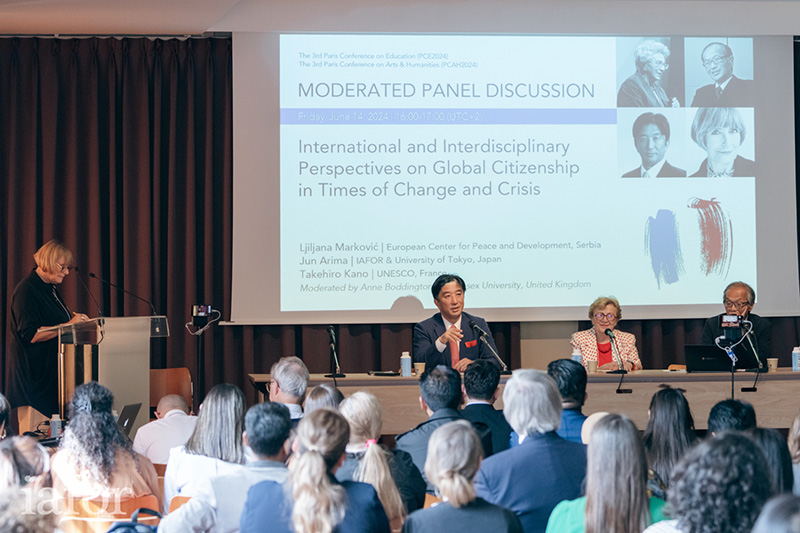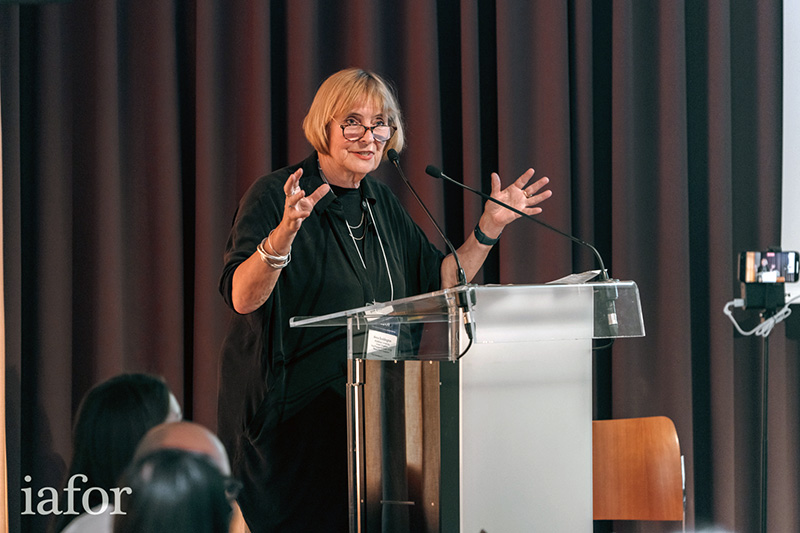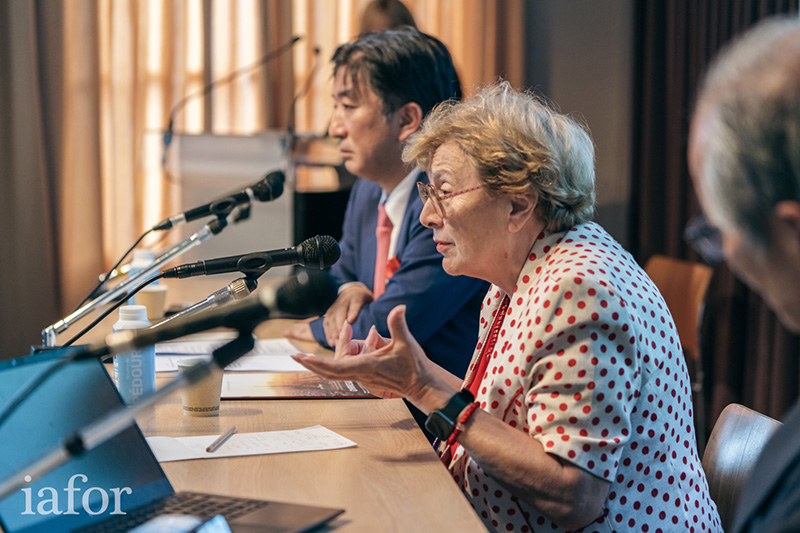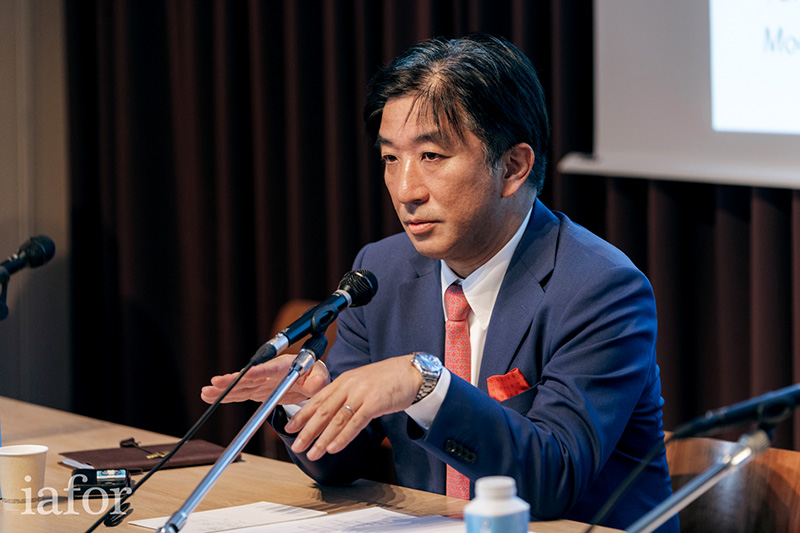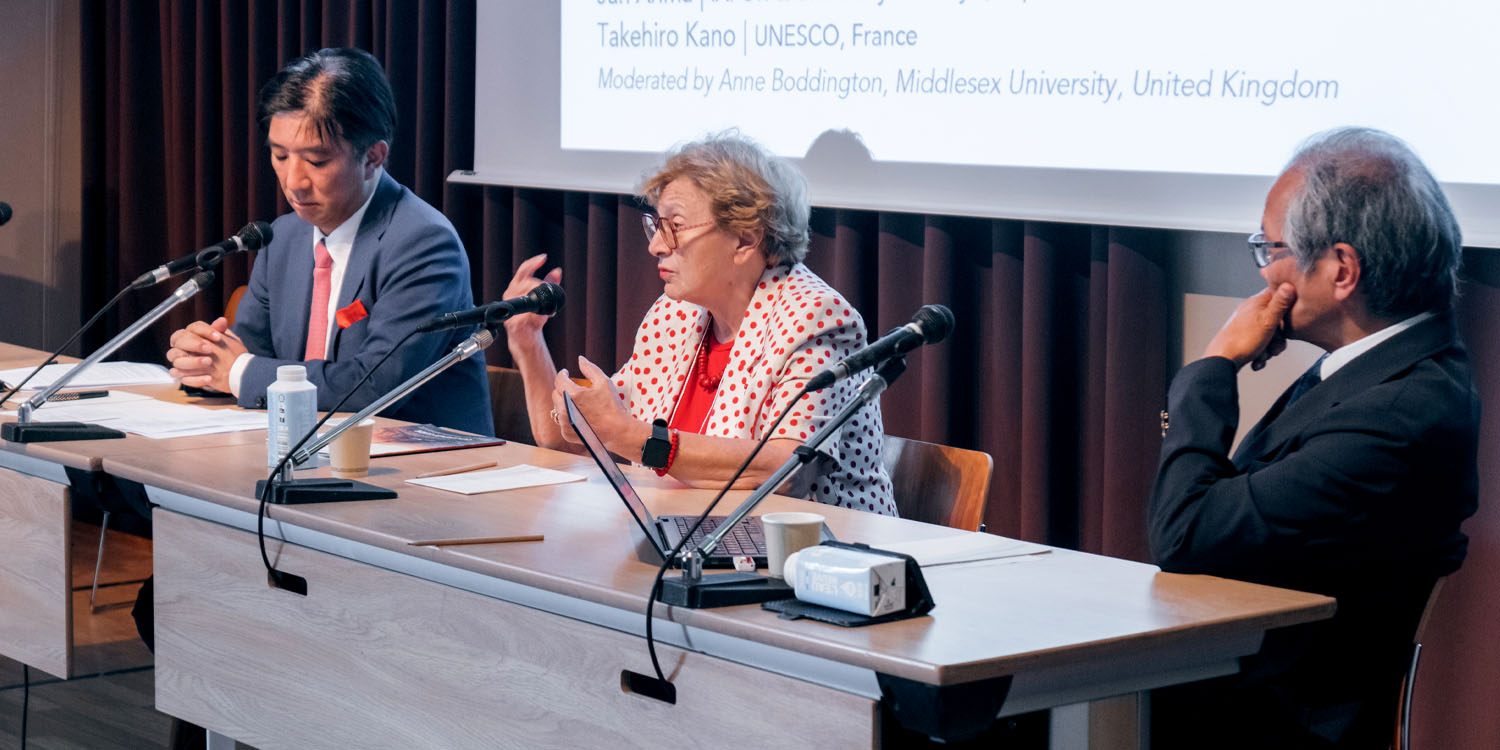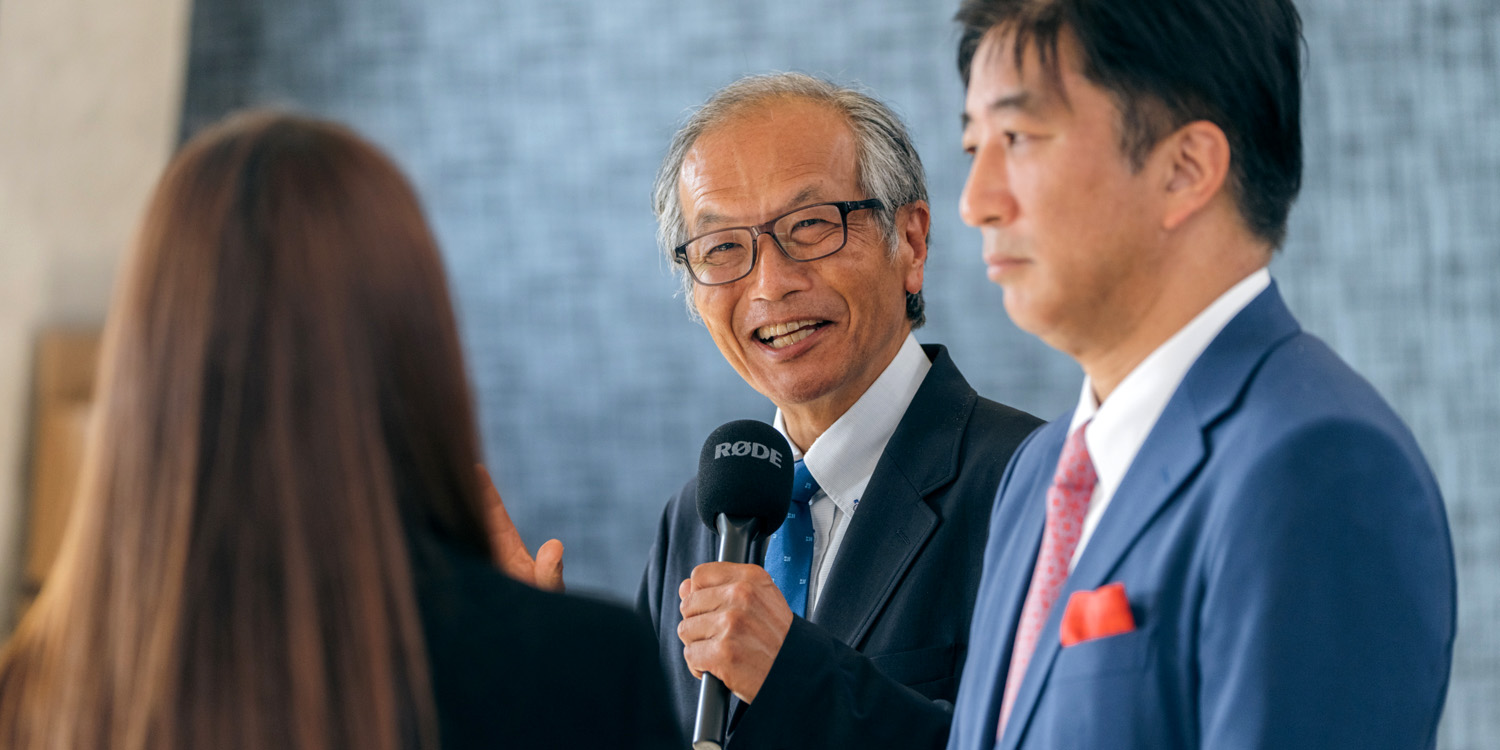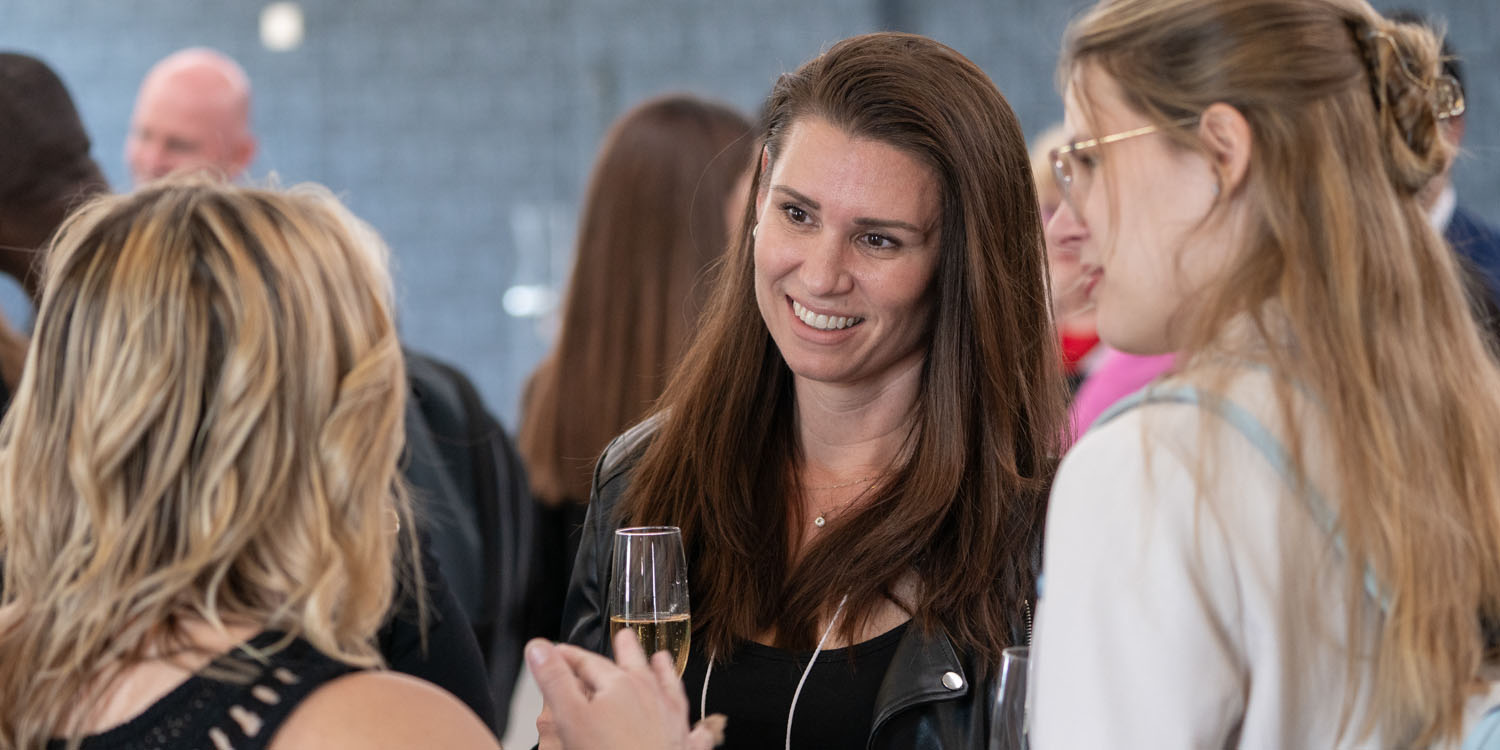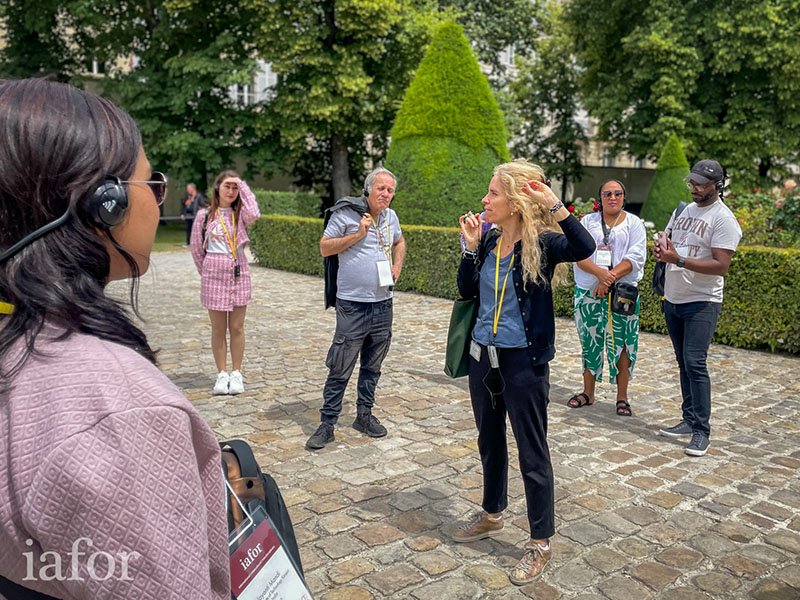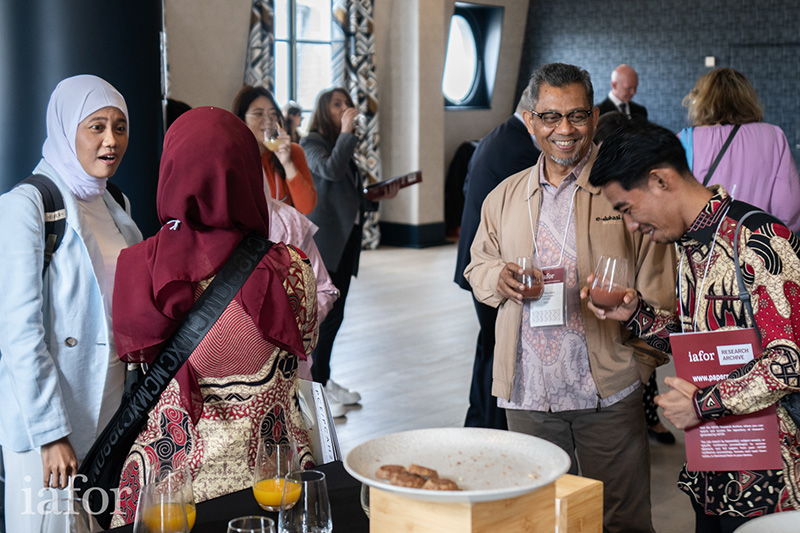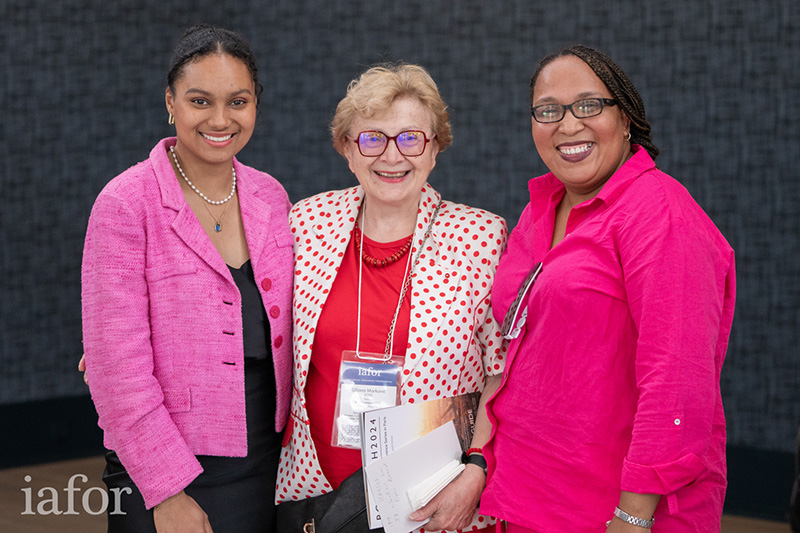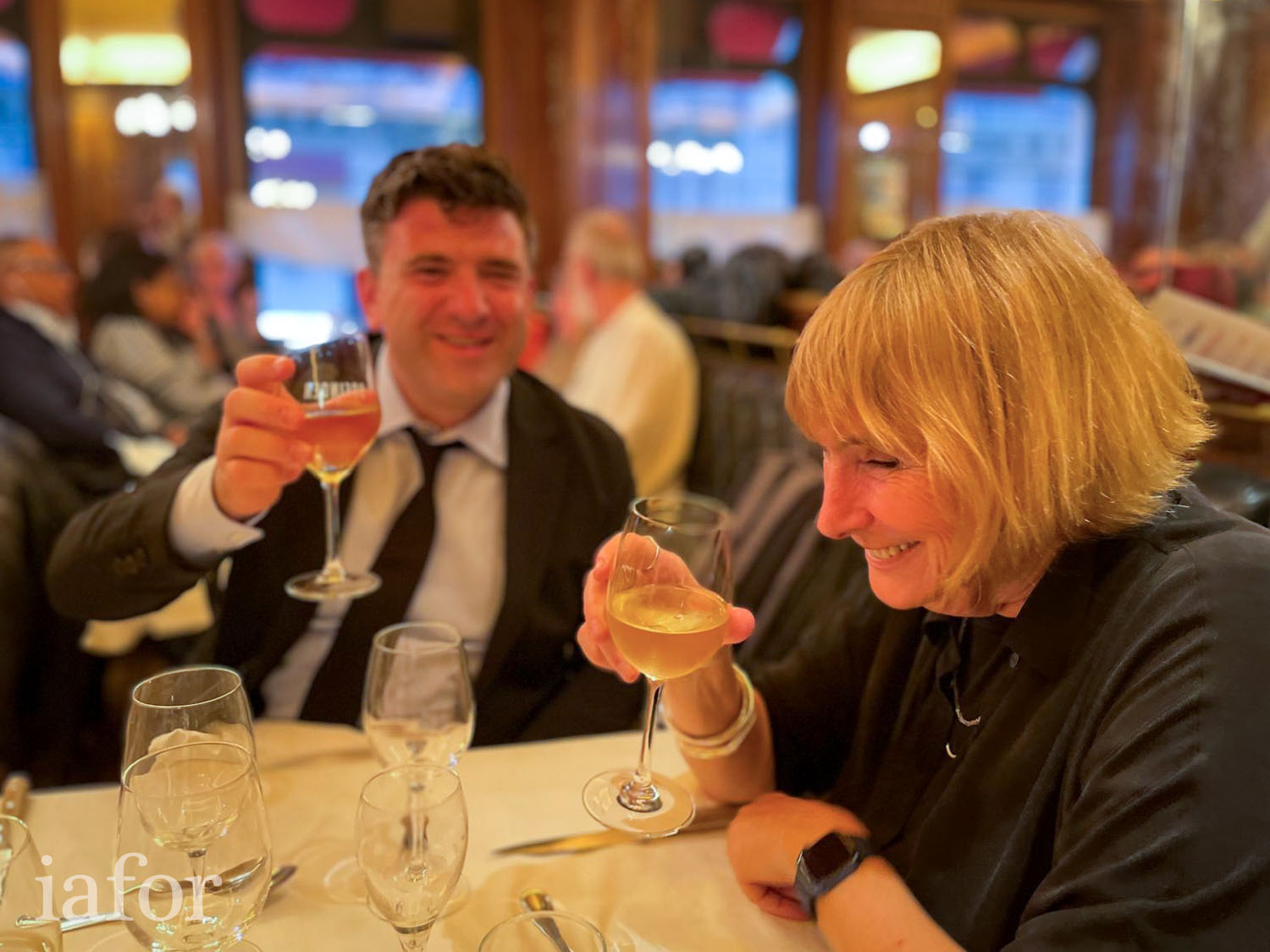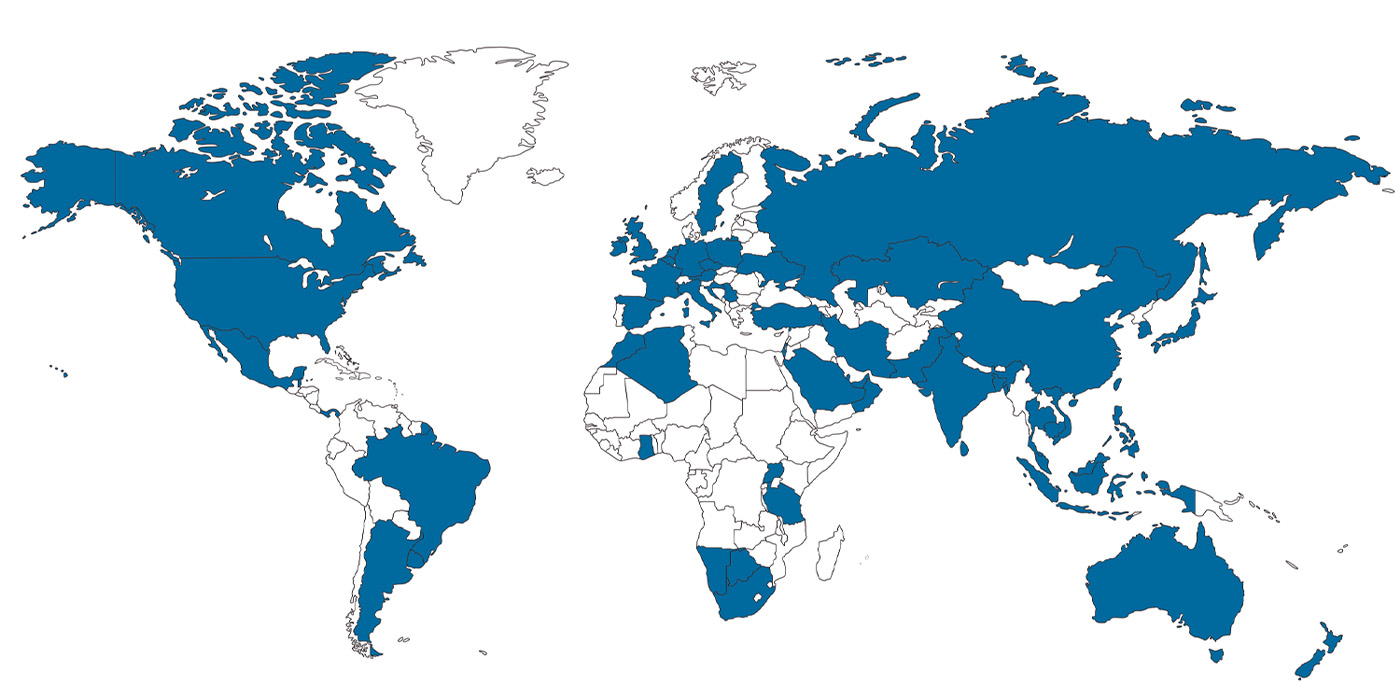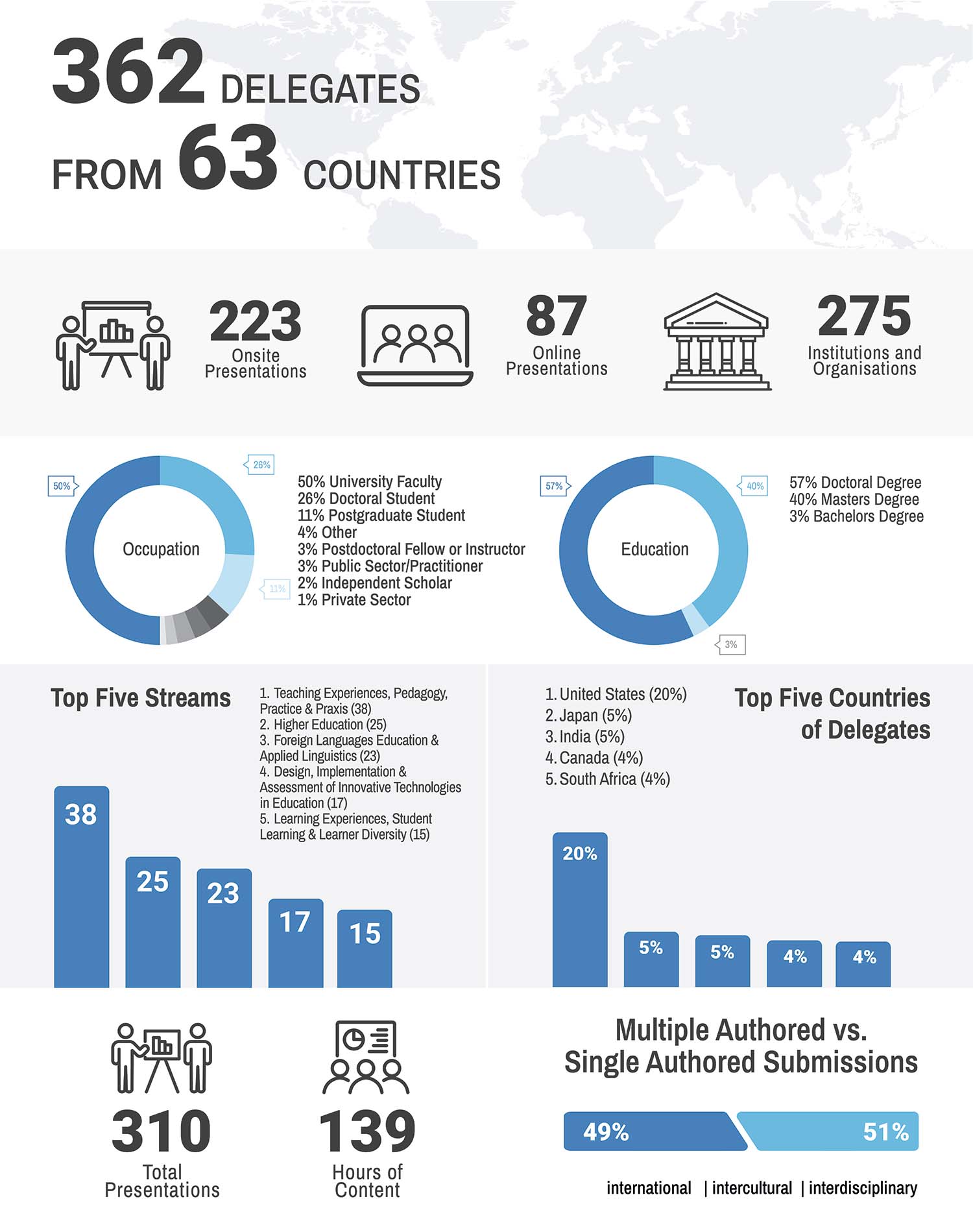A few weeks ahead of the Olympic Games in Paris, IAFOR held its annual Paris Conference on Education (PCE) and Arts & Humanities (PCAH) from June 13-17, 2024. Delegates from all over the world came together in the symbolic capital of Freedom, Equality, and Fraternity to exchange ideas and discuss pressing issues. Held in the Maison de la Chimie, over 360 participants from more than 60 countries gathered in the city that has for centuries been the centre of intellectual enlightenment and revolution.
Conference Report and Intelligence Briefing 2024 – Issue 4 – PCE/PCAH2024
Editors: Melina Neophytou and Apipol Sae-Tung
Published: July 30, 2024
ISSN: 2759-4939
Subscribe and Stay Informed
Receive key insights directly to your inbox.
Stay informed of the latest developments in academia.
100% free to read, download and share.
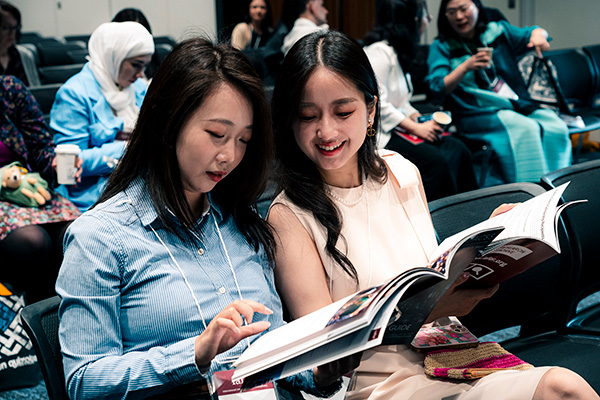
Contents
Introduction
In 2024, all eyes are on Paris. For one, the greatest sports event on the planet will be held there in July and August, offering a celebration of multiculturalism and human diversity. The Olympics are a testament to how competing national representatives can effectively engage in healthy rivalry while respecting each other’s differences. Since ancient times, warmongering nation-cities would cease their fire temporarily to find the Olympian champions to bring honour to their nation. In modern times, with the help of the International Olympic Committee (IOC), the Olympic Games were reintroduced in the 19th century, promising the same peace-building effects.
Peacebuilding and international cooperation have firm roots in Paris. This is where the headquarters of UNESCO, the United Nations organisation, whose mission is to bring peace through education and scientific cooperation, were established. Its predecessor, the International Committee on Intellectual Cooperation, was a group of intellectuals, notably including Albert Einstein and Marie Curie, whose discussions in Paris were to inform and balance out national interests in the League of Nations. The Paris Agreement, an international treaty on climate change, was also negotiated and adopted here by the international community in 2015, marking a tremendous achievement in international cooperation to tackle the climate crisis.
However, in the case of the IOC, an international organisation that prides itself on apoliticism and international cooperation, some questionable politics cause concern. Without solid democratic procedures and a history of following exclusionary methods, the IOC gets to decide on the participation eligibility of nation-states. For example, the exclusion of Russian athletes in the Olympics stands in stark contrast to the continued inclusion of Israeli athletes, when it comes to national representation. Russian athletes are not able to compete under their national flag, due to the ongoing war against Ukraine and several doping scandals, most notably the state-sponsored doping allegations at Sochi in 2014. On the other hand, Israel, another country engaged in a war against Palestine, is allowed to send athletes to represent its nation.
There are political reasons and national interests behind these questionable processes, which the IOC cannot escape without losing its credibility. Due to being indirectly tied to the United Nations and the Security Council, it follows the decisions of the world’s nations, despite claiming apolitical views itself. In the case of Russia and Israel, the difference in participatory eligibility is that Ukraine is internationally recognised as a sovereign state, whereas Palestine is not. Despite the IOC recognising Palestine’s rights since the 1980s, it is regrettably still a hostage to national interests.
The same may be true for international institutions such as UNESCO, who are tied to the United Nations. Despite being a supranational institution, it is still linked to an institution that favours national representation and allows for its members to exercise vetoes. This means that, even though it may have aspirational goals that transcend national boundaries as an institution, UNESCO’s aspirations remain just an ideal in the face of conflicting national interests that block any meaningful change. With decisions and policies seemingly being irrelevant or tone-deaf to ordinary people on the ground, some question whether international institutions represent people effectively. The attention towards Paris and the Olympic Games may arguably be one directed at international institutions, their role, and their limitations as a force for good in the modern world.
Today, many people feel alienated from the political discourse of national governments and international institutions. Discussions on global citizenship, sustainability, social cohesion, and peace lack practical context and insights into the lived experiences of those on the ground. These insights and plentiful creative solutions can be accessed by including ordinary people in the discussion process. IAFOR had the privilege of inviting two senior diplomatic figures associated with UNESCO, His Excellency Federico Mayor Zaragoza, former Spanish Minister of Education and two-term Director-General (1987-1999); and Ambassador Takehiro Kano, the sitting Japanese ambassador to UNESCO, to speak at our Paris conference. Both of them underlined that the cooperative and multistakeholder approach now employed by the UN and its agencies reflects this need to involve civil society and people on the ground in discussions and negotiations for a better future.
Where UNESCO’s actions are limited, intellectual and independent institutions, such as IAFOR, may be more successful in ensuring that inclusive and equitable discussions assist in giving all voices decision-making power and a platform to be heard. Much like UNESCO’s predecessor, the International Committee on Intellectual Cooperation (ICIC), IAFOR is able to leverage its wide and diverse network within academia, industry, politics, and civil society, thereby representing people on the ground, whose insights are ignored otherwise. Constantly striving to be international, intercultural, and interdisciplinary, IAFOR is capable of breaking free from national boundaries and interests, as our community represents diverse cultures, educational institutions, businesses, and nonprofit organisations unbound to nations. IAFOR is developing into one of the organisations that, according to our guest speakers and panellists, will help define the future of multilateral and multisectoral cooperation in what Ambassador Kano terms the “new post-post-Cold War” era.
Harnessing this geographical, political, and contemporary context of Paris, our IAFOR community engaged intellectually and interculturally to discuss how international institutions, envisioned as beacons of global cooperation and peace, frequently fall short of their lofty aspirations to truly represent and act for the people they serve.
2. Veto vs. We The People: The Time for Change
‘Unanimity is the antithesis of democracy’ and exactly where the problem lies with multilateral cooperation since the end of WWI, highlighted His Excellency Federico Mayor Zaragoza in his keynote presentation, titled Educating for Peace: A Call to Action for We the People. According to him, collective action of the people against what United States President Eisenhower saw as a ‘plutocratic government led by industry’ is the way to move from a governance based on armament to a governance based on peaceful mediation.
The United Nations’ preamble proudly proclaims that ‘We the People of the United Nations determined to save succeeding generations from the scourge of war’. According to Ambassador Zaragoza, this is ‘an excellent design of democratic multilateralism’ but that first phrase of the charter ‘for 78 years has not been able to be put into practice’. ‘We the people’ has never held any true power in multilateral cooperation. Ambassador Zaragoza attributes this failure to the introduction of veto rights and a governance based on force.
To make his point, Ambassador Zaragoza laid out the history of international collaborative efforts towards world peace, highlighting the role of the United Nations and its predecessor, the League of Nations. In the wake of World War I, a historical moment for world peace took place in Paris in 1919 at the Paris Peace Conference, resulting in the establishment of the League of Nations. With the endorsement of United States President Woodrow Wilson, a euphoria around multilateral cooperation arose, seemingly ending a period of conflict between nations by creating ‘the possibility for mediation and negotiation’.
The ambitious project never served its intended purpose. Ironically, the United States as the advocate for the League of Nations never joined the organisation it initiated. The global mindset since the dawn of time has been one of “if you want peace, prepare for war”, said Ambassador Zaragoza. This kind of governance was, and still is, a governance based on armament. When world nations want to resolve a war, they send troops to counter an invader. It’s impossible to talk about peace without using methods of force. Maintaining this mindset then is what eventually led to WWII.

His Excellency Federico Mayor Zaragoza, Honorary President of the Council of the United Nations Peace University’s European Center for Peace and Development (ECPD)
The United Nations, the League of Nations’ successor institution, was created after the end of World War II in pursuit of world peace. Under United States President Franklin D. Roosevelt, the Declaration on Human Rights to be adopted by the UN was drafted, creating another moment of hope. However, the democratic structure it set was undermined from the beginning by allowing five countries (United Kingdom, United States, France, China, and the USSR - later Russia), the winners of WWII, permanent seats on the security council and outsize influence, most particularly exercised through the power of the veto. This meant that any prospect of change that did not conform to the national interests of the victors of WWII could immediately be disregarded. ‘We had a perfect design of democratic governance’ said Ambassador Zaragoza, ‘but we have never been able to apply this first phrase ‘We the people’. We have failed to apply it because of the implementation of veto since day one’. The United Nations, hence, never actually represented the ‘We The People’ to which it referred to in the preamble of its charter, nor did it lead to a path for world peace.
Today, the people have more power than ever, owing to the advancement of technology and the internet. It is much easier for ordinary people to report their situation from isolated parts of the world, to spread information, rally others to a cause, and raise awareness. Marginalised people are given a platform to express themselves and, in many cases, hold their leaders accountable. What President Eisenhower saw as a plutocratic government led by industry, in which he had no power to enact any change, today can be challenged by the people, said Ambassador Zaragoza. He advocated for us to take advantage of today’s technology to join and express our voices, decisions, and knowledge, and to say no to veto. It is a way to express the immense force of human creativity to create a ‘new way of governance, understanding, and solidarity’, he said in his call for action.
To start acting, we need to focus on the delivery of quality education—a kind of education as it is stated in the Constitution of the United Nations Educational, Scientific, and Cultural Organization. The UNESCO Constitution states that ‘the educated are those that are free and responsible’ Ambassador Zaragoza stated that only those who are free and responsible can become acting citizens. Education, he argued, should not only focus on generating and reproducing knowledge but should aim to transform people from spectators to actors. The immense force at the global level is not armament, but the capacity of human beings that are unique and able to create a different world through ways of action.
It is ‘We the People’ against the ‘Veto.’ ‘We The People’ is a collective attempt to recognise equal human dignity for all human beings, regardless of gender, colour, or ideology. Without realising that all human beings are equal in dignity, ‘We The People’ cannot exist in serenity and solidarity. Ambassador Zaragoza highlighted that veto power has brought about irreversible (terrible) consequences in the past on issues relating to the environment, disease, and habitability of the planet. He concluded by reaffirming that we are in a pivotal moment where we can change and redress the global situation, but that in order to do this, world governance must become truly democratic and abolish the veto. Our global mindset should also shift from solving conflict through armament to solving it with mediation. The slogan of ‘if you want peace, prepare for war’ must shift to ‘if you want peace, prepare for ‘the word’, meaning mediation. That is how we can establish a governance based on peaceful negotiation.
3. Politics in the Olympics: Sports, States, and the IOC, and How We Are Related
Professor Patrick Clastres gave a timely presentation titled Olympism and International Relations from Pierre de Coubertin to the Present Day, highlighting the highly political nature of the Olympic games. Sports competitions, such as the Olympic games, were envisioned as one of the tools to bring world peace, and the world of sports was meant to be separate from the world of nation-states. As the co-founder of the International Olympic Committee (IOC), Pierre de Coubertin put in place the ‘opening ceremony’ of the Olympic games to manage possible tensions based on different ideologies and religions of the represented nations. However, the problem of world peace through sport lies in the nature of the athletes themselves being the representation of the nations. The sense of politics of states in the world of sports was brought about by the introduction of the national uniform in the 1908 Olympics. Some countries were banned from having athletes and their national identities, including uniforms, flags, and anthems, shown in the Olympic games due to international politics, such as Serbia and Montenegro in the diplomatic boycott in 1976.
In addition to national identity, it is important to balance the sense of patriotism and internationalism in the nature of international sports competitions such as the Olympics. Responding to the changes in the ideal nature of the Olympics, Professor Clastres raised a thought-provoking question about whether it was worth the money for France to spend 10 billion USD to organise the Olympics, given the Olympics is largely used by the state to reinforce a country’s presence in the world, but not to promote peace.
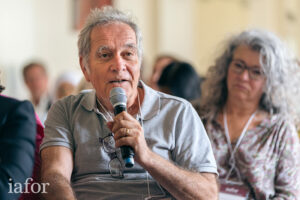
A delegate posing a question during Professor Clastres' presentation
In fact, the notion of nationalism was included within the Olympics concept only a few years before the First World War, as mounting nationalist sentiments spread throughout Europe. National representation of athletes was the product of its time and may not serve in the best interest of the current political landscape of today, said Professor Clastres in an interview with IAFOR. ‘Before WWI, athletes competed as individual agents. Today, they have become hostages to national politics’ he said while urging the IOC to revert to its previous individual or club representation model.
Professor Clastres argues that the problem of inclusivity has existed throughout the history of the Olympics due to the nature of what he termed ‘authoritarianism’ in the sports world. At the beginning of the Olympics, amateurism was used to exclude people based on their gender and social backgrounds, preventing a broader participation in the Olympics. Within the IOC, although women represent about 46% of the people working in the committee, they do not hold high positions within the organisation; the IOC did not include women on the committee until as late as 1981. Women athletes are asked to go through physical checks to prove that they are biologically women and to take medicines to naturalise their testosterone levels, while men with naturally different testosterone levels are not required to do the same. Sports represented in the Olympics are also predominantly Western sports, set by the IOC for particular audiences and news media outlets. In its history, there were only two non-Western sports introduced to the Olympics: Judo in the 1960 Tokyo Summer Olympics and Taekwondo in the 1988 Seoul Summer Olympics.
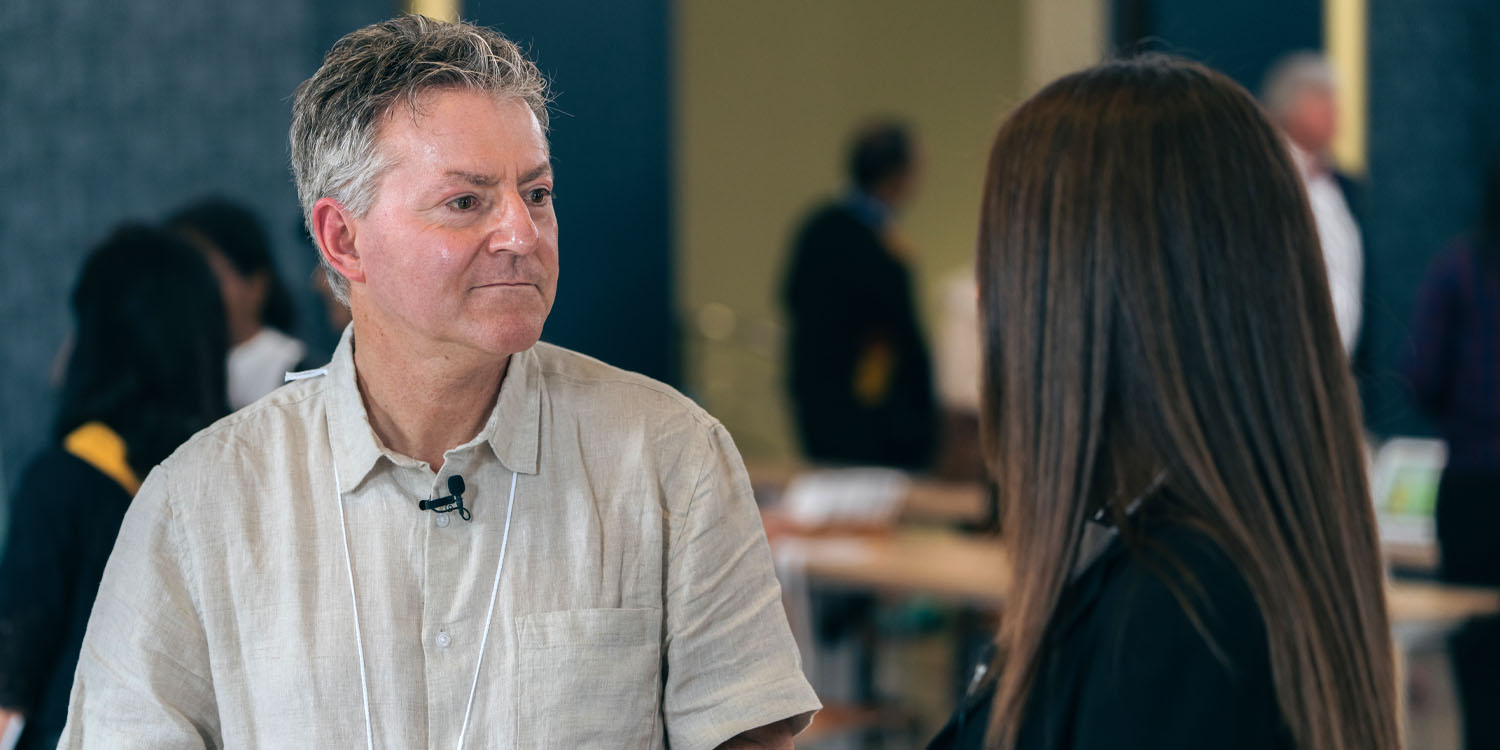
Professor Patrick Clastres, Lausanne University, Switzerland, during an interview following his keynote presentation
Professor Clastres focused intensely on the political aspects of the IOC in his talk. The IOC, he argues, has created a ‘parallel world,’ where it manages politics within the Olympics through its international connections. The IOC shapes the narratives of the Olympics through its allied connections with ‘official’ artists, journalists, and historians. Professor Clastres states that the IOC has created ‘pseudo historians’, where they write only a part of ‘the truth’ about the Olympics with the influence of the IOC. Moreover, the politics within the IOC are less than democratic: compared to the one-nation-one-vote system utilised by the Fédération Internationale de Football Association (FIFA), the IOC has 106 sitting members representing 70 countries out of the 206 countries it recognises. The IOC operated figuratively on a ‘gentlemen’s agreement’, representative of the agreements of the upper classes, without formal statute until 1981, the year when a few women were first appointed to the IOC. The IOC is very protective of its institution, which has had just eight presidents throughout its 130 year history. The IOC maintains its power in the international arena through the funds it had given back to international federations and National Olympic Committees. To make the IOC more accountable and transparent, Professor Clastres urged ‘the citizens of the world’ to first look into how their National Olympic Committees budget the funding they receive from the IOC, so as to encourage accountability and towards a more transparent ecosystem and better governance structure of the Olympics.
People are and should be at the heart of the Olympics, Professor Clastres argues. People are enthusiastic about the Olympics because they want peace, justice, and liberty, and the IOC should assume its mission to defend ‘peace, freedom, and fraternity.’ Only by reforming its roles and missions will the IOC be able to represent the motto of the Olympics: Faster, Higher, Stronger – Together.
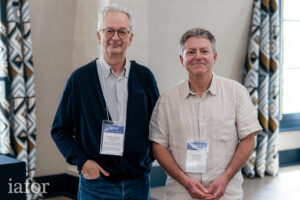
Professor Clastres with Conference Programme Committee member Professor Georges Depeyrot of the French National Center for Scientific Research (CNRS)
In an interview later on, albeit the criticism towards the IOC, Professor Clastres also shared some positive aspects and outlooks on the future of the institution and the Olympics. It is worth noting that the IOC has, in some cases, been ahead of the United Nations’ political decisions on inclusion and acknowledgement. For example, the IOC has recognised Palestine as an independent country since the 1980s, whereas the UN still struggles with this issue. Echoing Ambassador Zaragoza’s point about the veto within the UN, Professor Clastres also cites the process of veto within the IOC as a major obstacle to inclusive and effective decision-making.
Unfortunately, the IOC cannot challenge the status quo on its own, Professor Clastres argues. As an institution, it still needs to fall in line with the decisions and view of the World of Nations, otherwise it risks losing its credibility. ‘IOC members must be protected, not controlled, by international institutions such as the United Nations. They should be regarded as ambassadors of the UN and the athletes as messengers of peace’.
‘We must be confident in the future’, said Professor Clastres. ‘With the emergence of new economies and the rise of developing countries, favourable developments may be on the horizon. The IOC will change its president in 2027. It may well be that the new president could come from the Global South. The best way to move forward is to think in terms of human rights and freedom. If we can move beyond the concept of nationalism and think of athletes as independent agents, it would be a great step forward’.
4. Cultural Heritage, Peace Education, and Climate Change from an Institutional Perspective
The confidence and rules-based order of political and economic liberalism and liberal internationalism of the Global North has been quite shaken and destabilised, as previously marginalised groups present new concepts and perspectives and bring new voices to the idea of peace, climate emergency, and how we may consider our heritage and what we do with it. International institutions are particularly feeling this change, while citizens all over the world look at political decisions with apprehension. The paradoxical nature of international institutions is questioned by the global community: they are envisioned as beacons of global cooperation and peace, yet frequently fall short of their lofty aspirations to truly represent and act for the people they serve.
In 2023, UN Secretary-General Antonio Guterres proclaimed that we have exited the post-Cold War era and entered a new one, coined by Ambassador Kano as the post-post-Cold War period. What this period looks like is still unclear, but one thing seems to be gaining momentum: multilateral cooperation between varied stakeholders is changing, including, among others, industries, civil society, and political and educational institutions. During the post-Cold War period, there was a euphoria about multilateralism. However, the world has shifted from this trajectory. We are living in a completely different world than from 30 years ago. Different countries are now recognising the increasing importance of the Global South, and the need to include them in making decisions.
The panel on International and Interdisciplinary Perspectives on Global Citizenship in Times of Change and Crisis, moderated by Professor Anne Boddington, focused on how international institutions attempt to harness the insights of these different stakeholders to enact positive change where institutions fail to operate effectively and ethically. Three panellists who are engaged in three different international institutions shared their insights on how international institutions work and how their role will change: Ambassador Takehiro Kano, the current Japanese Ambassador to UNESCO in Paris; Professor Ljiljana Marković, a professor and academic director at the United Nations University for Peace’s European Center for Peace and Development (ECPD), Serbia; and Professor Jun Arima from the University of Tokyo, Japan, a chief negotiator at the COP, the UN’s Convention on Climate Change. The three panellists discussed how their respective institutions go about cultural heritage, education, and climate change, each highlighting the need for a different kind of multilateral cooperation to achieve all those aspirational goals for a better future.
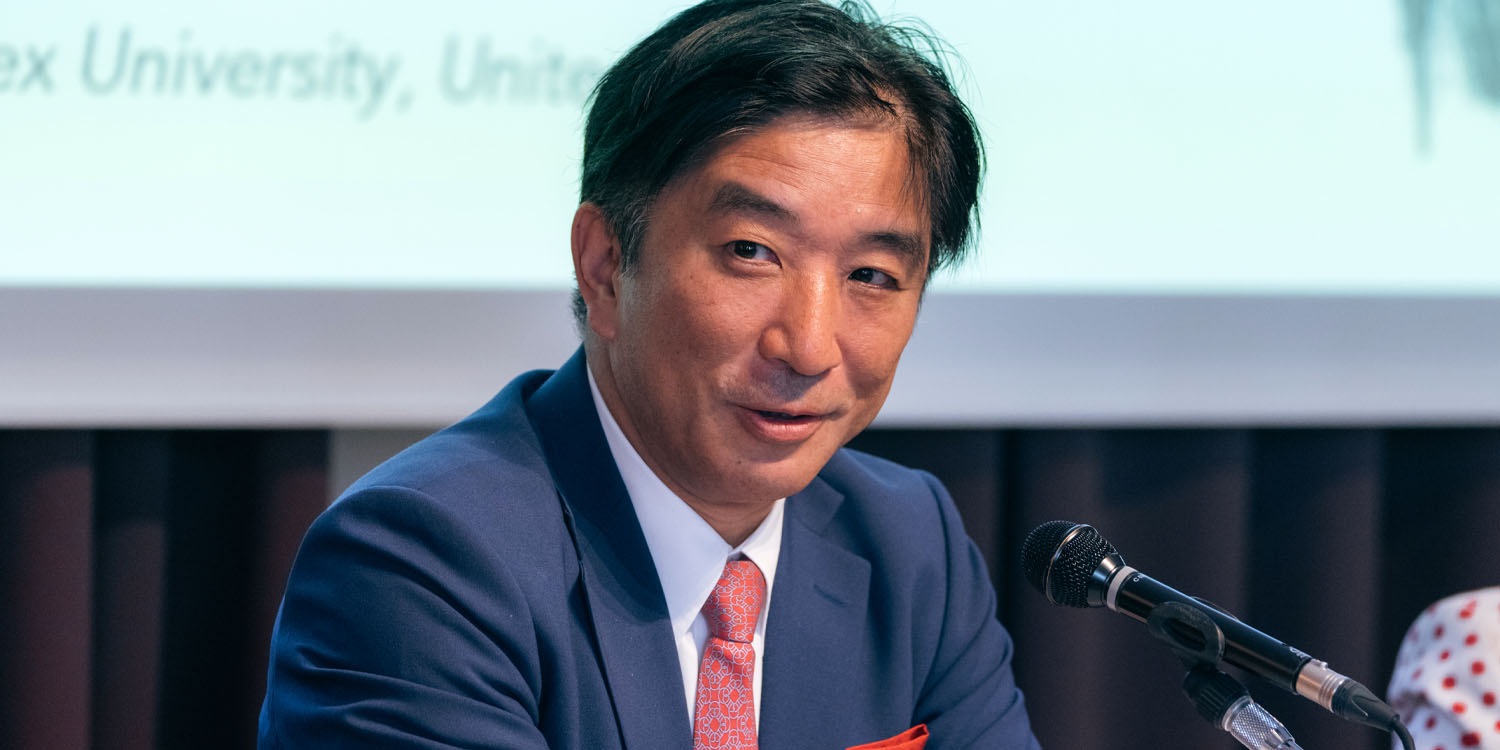
Ambassador Takehiro Kano, the sitting Japanese ambassador to UNESCO
4.1. International Organisations and Non-Governmental Stakeholders
The three panellists were called to first introduce their respective organisations and reflect on what and how they engage and harness stakeholders outside of governments for positive change. All three panellists observed changes in how multilateral cooperation is currently unfolding, but refrained from defining it as a clear way of moving forward. There is much more diversity within international cooperation, but it is still unclear how current power vacuums will be filled, and how willing government sectors are in accepting intersectoral and international input.
Introducing her institution and its mission, Professor Marković said that the main focus of the European Center for Peace and Development is educating graduate students on the importance of peace. Professor Marković raised the issue of an existing vicious circle, wherein the role of education as an enabler of economic growth and development needs peace and good education to be achieved, and this, in turn, needs financial support. ‘Without economic growth, quality education and peace cannot be achieved, and without quality education and peace, no economic growth can be attained’.
Quality education, research, and interdisciplinarity are the foundation of all international cooperation, as Professor Arima highlighted. In the case of cooperation on climate change, education plays an essential role in convincing people of their responsibilities toward the planet and engaging them in debates and decision-making processes. Until 2015, discussions were mainly intergovernmental, said Professor Arima. However, particularly after 2020, the focus has shifted to broader participation of stakeholders from various sectors and industries, acknowledging the limits of national government power. Academia is needed to discover and discuss the cause and impact of climate change, as well as the socio-economic implications. Industry is the powerhouse of new, eco-friendly technologies. Civil society plays a role in raising awareness for environmental issues, while indigenous people and other minorities enrich the discussions considering all perspectives. Finally, cities – the epicentre of emissions and urbanisation – and their councils are great vehicles of implementing policies in their communities. Professor Arima observed that the number of participants from non-governmental entities is increasing each year.
Reflecting on what UNESCO does and how it engages and harnesses stakeholders outside of governments for positive change, Ambassador Kano said that the institution’s mission is to promote peace and security through education, science, sports, and culture. The core is intellectual cooperation, which can be achieved through educational initiatives. The precursor of UNESCO, the International Committee for International Cooperation (ICIC) that was established in Paris before WWII, was made up of committee members from different countries who acted as representatives of those countries, and did not speak on behalf of their national governments. They instead discussed important matters through their professional or private capacity, in much the same way as delegates at IAFOR conferences engage today.
However, while UNESCO’s representatives now represent member countries, unlike other international organisations, such as The Organisation for Economic Co-operation and Development (OECD), UNESCO has kept its precursor’s tradition by involving all sorts of stakeholders outside of the government, including journalists, academics, business leaders, and artists. With 194 member states, it is one of the most inclusive international institutions regarding education, science, sports, and culture.
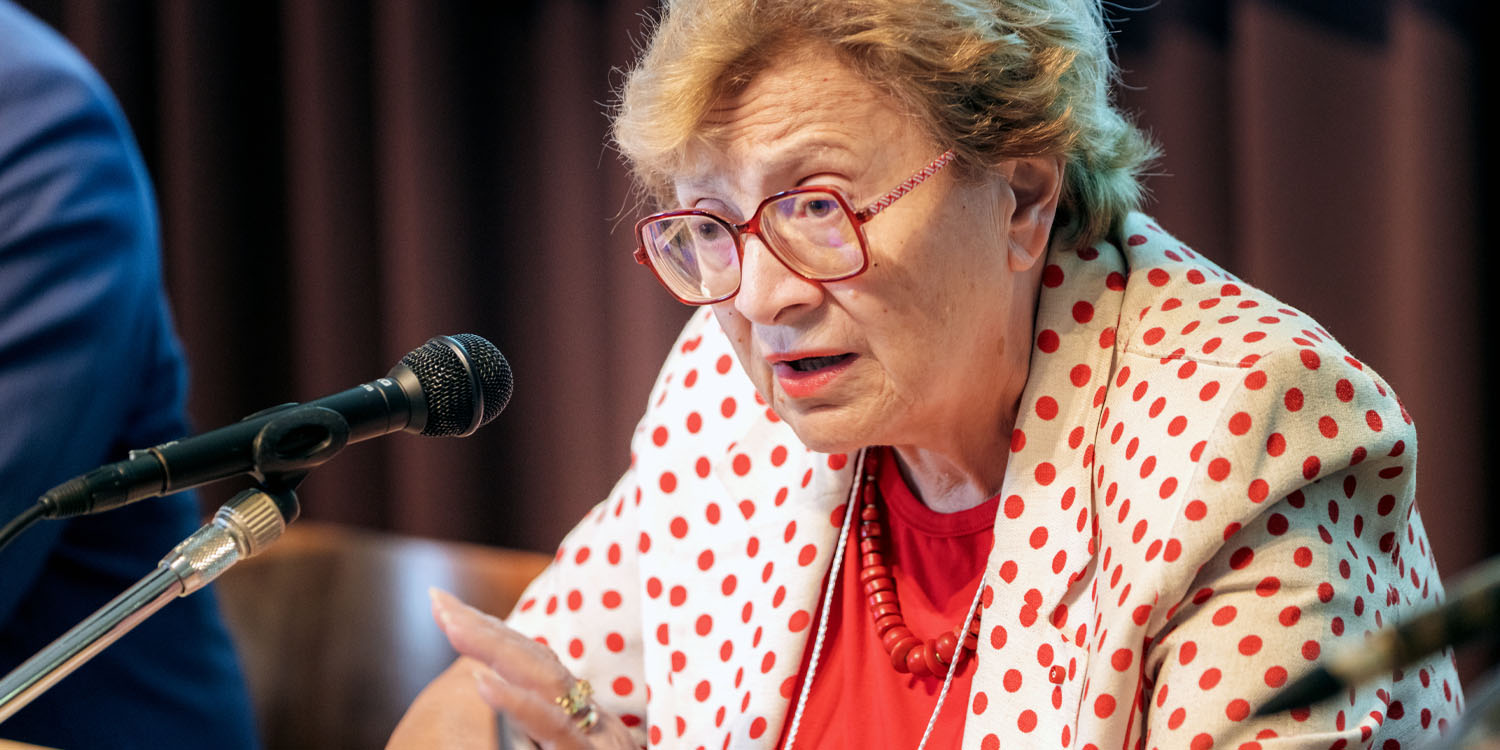
Professor Ljiljana Marković, a professor and academic director at the United Nations University for Peace’s European Center for Peace and Development (ECPD), Serbia
4.2. Limitations and Barriers to International Cooperation
Inclusiveness is usually seen as a positive characteristic of democratic decision-making. However, how the myriad of opinions and positions is processed can hinder the possibility of reaching a consensus. As a former Director-General of UNESCO, Ambassador Zaragoza mentioned in his opening speech that, in the case of UNESCO, a major hindrance to reaching a consensus is the exercise of each member state's veto. Decision-making within UNESCO has to be unanimously made, which limits the capability of the institution to move forward quickly and make any meaningful decisions. Ambassador Kano agrees that even after decades, this is still a problem.
According to Ambassador Kano, a more crucial problem is the dysfunction of international institutions we have witnessed since 9/11. The international community has since started to crumble, and this is reflected within international institutions as well. There is a cause-and-effect question of whether dysfunctional institutions are the product or the cause of war. Did the world become so polarised because institutions were dysfunctional, or has 9/11 destabilised world politics to such a degree that institutions could not operate efficiently? Whatever the case may be, not being able to maintain international and intra-state peace and harmony is a problem to international cooperation.
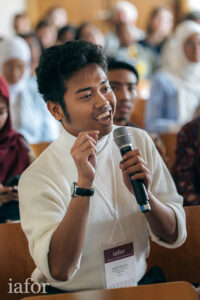
A delegate posing a question during the Q&A session at the end of the panel presentation
At this point, Ambassador Kano recalled UNESCO’s motto: ‘Since wars begin in the minds of men and women, it is in the minds of men and women that the defence of peace must be constructed’. Although it is hard to find a solution to this complex issue, he urges the people to try and reconstruct multilateralism in international institutions. He asserted that we are entering the “post-post-Cold War period”, and that now is the time to define what this means and what this period looks like. Institutions should ask themselves what multilateral cooperation looks like within this new era, but he said that ‘perhaps, it is up to us [the people] to define this’.
The people have to play a much more prominent role and take on more responsibilities when it comes to creating a peaceful and sustainable community. For this, education plays an important role. Within the debate on climate change and greenhouse gas emissions, Professor Arima stated that its mitigation is a shared responsibility between all members of the global community. However, the mitigation costs and their proportion to national GDPs are different for each nation-state. Who is going to bear the cost of global market failure? Professor Arima worries that people will not be willing to pay for higher climate change mitigation costs amidst a rising cost of living. Cleaner and greener energy would inevitably mean higher energy consumption cost, which people can barely afford. This is reflected in the fact that green parties have lost a lot of seats in the European parliament in recent elections. With rising energy and living costs, people’s attention seems to be shifting to more everyday life problems. The general public needs to endorse climate change policies before these can be implemented. Without this endorsement, climate change mitigation becomes a difficult issue.
Political decision-making due to global geopolitical tensions and national priorities is another obstacle to international cooperation on climate change mitigation. Climate change mitigation requires enormous financial support. However, with the current violent geopolitical situation globally, many countries are giving budgeting priorities to military expansion. This could potentially crowd out finances for climate change, warned Professor Arima. There is also a clear difference in priorities in developed countries (climate crisis mitigation) and developing countries (economic growth, education, and job opportunities). Unless both sides are on the same page, international endeavours for combating climate change will be futile.
Professor Arima mentioned that one of the remedies to these limitations is education. People need to be educated about responsibilities and solutions, and about how imminent the threat of climate change is. This requires a higher quality education, but the question again becomes one of whether people will be willing to pay for a higher quality education. Just like Professor Arima, Professor Marković worries that the current economic situation will discourage people from wanting to spend more on aspirational, global goals. Instead, the majority of people would probably opt to fulfil their everyday life needs.
With these higher costs for quality education, international institutions are becoming increasingly unable to shoulder all this financial burden by themselves. The United Nations, the mother institution of the ECPD, has felt this need for years to move into multilateral cooperation with stakeholders from various industries and sectors.
The limitation of the ECPD is that it is a graduate school and, as such, has a limited range of people and it can reach and educate. Professor Marković commended IAFOR for its ability to reach wider and more diverse audiences, and prompted educational institutions worldwide to collaborate with NGOs like IAFOR. By creating courses, or holding conferences and roundtables, such diverse stakeholders can fill in the gaps that educational institutions are unable to. Professor Marković recalled the vision of the United World Colleges, where even 16-18 year old students could be reached and educated on peace. She also urged educational institutions to attempt reaching students in the kindergarten, primary, and secondary education levels. These children are currently under attack from violent video games and cartoons, which teach them that it is acceptable to use violence, or that violence is normal. More levels of education should include peace education in their curricula in order to sensitise students on global issues and promote active participation in decision-making processes.
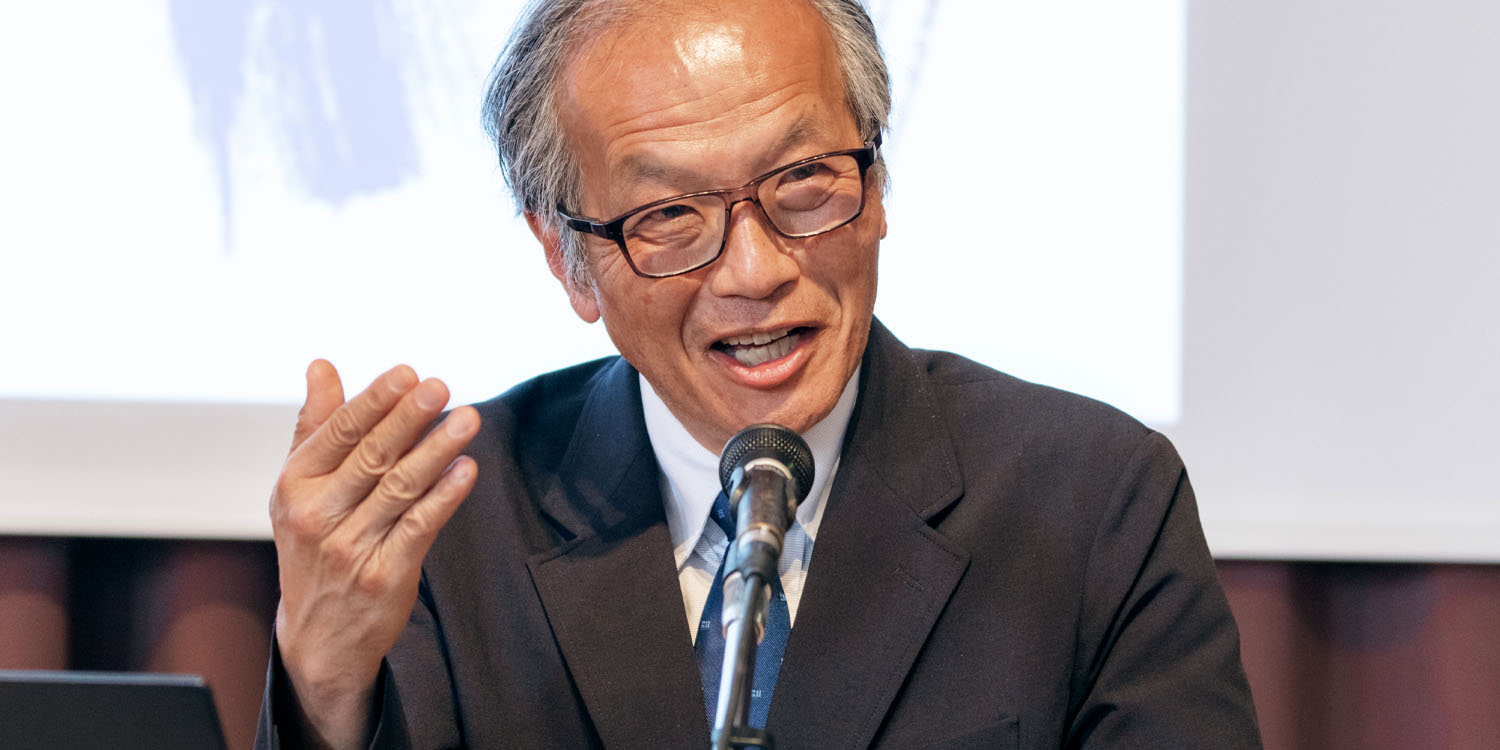
Professor Jun Arima from the University of Tokyo, Japan, a chief negotiator at the COP, the UN’s Convention on Climate Change
4.3. The Future of International Cooperation
From who and where should we anticipate change and new ideas in this new post-post-Cold War era? All panellists agreed that for international cooperation to be effective in the near future, it must give more power to developing countries from the Global South. This is currently not the case in reality, but it may well be one of the reasons why international institutions have become dysfunctional in the face of increased geopolitical tension.
Agenda-setting is an area in which we are likely to see a change, according to Ambassador Kano. Which countries have the power to decide or judge what is wrong or more important? The Global North used to have this power, but this has recently shifted. From the 1990s onwards, power has diversified. Asia, Africa, and Latin America are also rising on the political and economic scenes. Their capabilities are growing, thereby changing who judges and sets the agenda. Intergovernmental agenda-setting may also change as it is currently undemocratic and dysfunctional. Ambassador Kano pointed out that ‘a great example of this is how conflict and war in different parts of the world receives a different level of coverage and importance at the moment. The war in Gaza and Ukraine has received great attention, whereas the exodus of the Rohingya in Myanmar has been quietly buried. In the case of Israel, international institutions acknowledge Israel’s right to defend itself, but want to hold the government accountable for not adhering to international law’. However, individual nation-states’ governments do not follow this reasoning, Ambassador Kano argued. Instead, they each have their own views, which are shaped by the interests and diplomatic relations they have with countries of the Global North. This is likely to change with multilateral cooperation increasingly involving stakeholders other than nation-states.
The same development is desired for multilateral cooperation on climate change mitigation. Professor Arima urged institutions to become more pragmatic. Developing countries are currently forced to shut down their industrial operations. At their current stages, these newly emerging economies are dependent on economic growth, and shutting down their operations will be fatal. More importantly, this imposition may be seen as eco-colonialism. We should avoid this situation, said Professor Arima.
While it would be more democratic to allow developing countries to define their own course of action regarding climate change, there is also a gap between how developing and developed countries approach the issue. Climate change mitigation involves high financial costs. Developing countries tend to focus on mitigation, based on evasion of financial debates. Professor Arima noted that we should shift from more mitigation-oriented debate to adaptation-oriented debate. The international financial debate should change its mode.
The international climate change debate used to be characterised by sensationalism. However, nowadays, the narrative has changed to ‘do not overpanic’. By engaging the Global South and developing countries, we can prevent the adverse effects of climate change. By continuing to exclude them from the debate, the goal of climate mitigation will be unattainable.
This goal will also be unattainable if we continue applying current technologies. Professor Arima highlighted the role of technology and especially innovation in combating climate change. Futuristic technologies, even if incomplete at the moment, should become more affordable. In order for this to happen, more research and innovation is needed to convince industries and decision-makers of new technologies’ effectiveness. To this, Professor Marković asserted that innovation and research is exactly what high-quality education can produce. However, we should bear in mind that education is a generation- and decade-long investment, and its effects are not immediately observable.
Reflecting on differences between the education systems in Japan and European countries, both Ambassador Kano and Professor Arima, who have experienced both systems, highlighted why education is important for future international cooperation negotiations. While Japanese students are brought up in a system that values the reproduction of knowledge accurately, their European counterparts are being educated on how to communicate such knowledge effectively. This often translates into European students being more outspoken and opinionated, and with better negotiation and debate skills than their Japanese counterparts. Ambassador Kano observed that, when negotiators come together within international institutions, often it is the Japanese ones that are taken aback by the strong argumentative expression of Europeans, who are highly skilled in making their voices heard the loudest. Professor Arima suggested that if we teach young people how to negotiate and debate, they will eventually become strong debaters and representatives of their countries’ interests. To make the Global South’s voices be heard, one of education’s foci should be the building of negotiation and argumentation skills. Of course, this brings with it an awareness of global issues and a sensitivity to global crises.
4.4. Implications
Inevitably, education, climate change, peace, and cultural heritage preservation are intertwined. According to the panellists, education holds the key to more democratic and informed decision-making, allowing for marginalised voices to be heard. Although inclusive on the surface, international institutions have far too long placed little importance on the opinion of developing countries, while also limiting the debate to inter-governmental parties. The recent trend in involving more stakeholders, such as academics, the media, industries, civil society, and artists, is shaping the future of multilateral cooperation, but much more has to be done in terms of considering whose opinions have more or less weight.
Giving the Global South, up to now mere bystanders, more power in the decision-making process would mean that the Global North would have to change its role and priorities on the international scene. Can the Global North allow the Global South to take over? Perhaps, this will be an inevitable outcome of the current state of affairs, forcing developed countries to take a step back. In the worst-case scenario, the Global North’s inflexibility could lead to much more polarisation and irreversible damage to nature, cultural heritage, and peace.
Later this year at the UN Summit of the Future in New York, the post-2030 SDGs will be discussed. A document called the ‘Pact for the Future’ will show the vision for the post-2030 agenda, and whether developed countries will become more flexible in accommodating voices from the Global South in a more constructive way.
5. Conclusion
The current contentious global political landscape has weakened the international community’s capability of reaching a consensus on many global issues. International institutions are increasingly faced with public apprehension, as citizens do not feel represented by national interests, and are alienated from institutions’ lofty aspirations. Institutions are called upon to change their modus operandi and redefine multilateral cooperation.
We are currently in a transitional period, presented with an enormous opportunity for ‘we, the people’ to reshape and be part of the global community’s decision-making process. Not only is the political power landscape becoming multi-polar with the emergence of the Global South, but various non-governmental stakeholders are also gaining decision-making power. These exciting developments present an opening for more inclusiveness and potential innovation through different channels of cooperation. It also allows for more action, while also holding international institutions and governments accountable; something that was at the centre of this conference’s debates. All speakers and panellists have urged for more action from the people. It looks like the current political landscape is conducive to allowing civil society, academia, the media, and industrial sectors alike to redefine what international cooperation looks like.
So, how do we act? And how do we act as a community in this new era? Our speakers and panellists at The Paris Conference on Education (PCE2024) and The Paris Conference on Arts & Humanities (PCAH2024) foresee that this will be one of the turning points of international cooperation and development in the 21st century. Our ultimate goal should be fostering peace and prosperity throughout the world. This can only be achieved if international cooperation becomes inclusive, ethical, and representative of the global community of citizens. The UNESCO motto from decades ago still echoes true today: ‘Since wars begin in the minds of men and women, it is in the minds of men and women that the defence of peace must be constructed’. The question remains who decides who these men and women are, and how much power they are given to make their voices heard.
Conference Networking and Cultural Events
Networking events within our conference programmes provide designated spaces for open discussion, forming professional connections, and inspiring collaboration within and outside the conference venue. The PCE/PCAH2024 itinerary featured a variety of such spaces, sharing them alongside returning delegates and new members alike, as well as local artisans and cultural practitioners.
An afternoon tour of Musée Rodin served as the Paris programme’s Cultural Event, and an exceptional prelude to the conference on Thursday, June 13. The guided tour brought delegates through the century-old estate dedicated to preserving the works of famed Parisian sculptor Auguste Rodin, where delegates were given intimate knowledge of his life and his work.
The PCE/PCAH2024 Welcome Reception capped off the conference plenaries at the Maison de la Chimie, on Friday, June 14. Delegates both familiar and new to the IAFOR network were welcomed to carry on discussions prompted by this year’s keynote presentations with the speakers themselves. IAFOR’s 2024 Paris programme was heavily influenced by key individuals active in UNESCO, as well as renowned scholars in the field of peacebuilding and global events, who joined delegates to speak one-on-one about their work, research, and ideas. The Welcome Reception is always free for all registered delegates to attend, where they are encouraged to expand upon the programme and their network.
The Conference Dinner followed the reception, leading delegates to Brasserie Bofinger, a one of Paris’ more renowned brasserie in the city centre. Like the reception before it, the Conference Dinner provides a more relaxed space for delegates to discuss programme topics as well as get to know other researchers in their respective fields over the classic combination of good conversation over an exemplary meal. Professor Grant Black, a member of IAFOR’s Board of Directors, welcomed delegates to Paris and gave a congratulatory message in regards to a successful plenary programme.
Subscribe and Stay Informed
Receive key insights directly to your inbox.
Stay informed of the latest developments in academia.
100% free to read, download and share.

PCE/PCAH2024 Key Statistics
Delegate World Map & Country Breakdown
Total Number of Attendees: 362
Total Number of Countries Represented: 63
| Country | Count |
|---|---|
| United States | 76 |
| Japan | 20 |
| India | 19 |
| Canada | 18 |
| South Africa | 17 |
| United Kingdom | 17 |
| Indonesia | 15 |
| Hong Kong | 11 |
| Brazil | 10 |
| China | 9 |
| Philippines | 9 |
| Thailand | 9 |
| Vietnam | 9 |
| Taiwan | 8 |
| Mauritius | 6 |
| Spain | 6 |
| Australia | 5 |
| Mexico | 5 |
| United Arab Emirates | 5 |
| Colombia | 4 |
| Ecuador | 4 |
| Ghana | 4 |
| Italy | 4 |
| Kazakhstan | 4 |
| Macau | 4 |
| Portugal | 4 |
| Chile | 3 |
| France | 3 |
| Germany | 3 |
| Iraq | 3 |
| Ireland | 3 |
| Singapore | 3 |
| Country | Count |
|---|---|
| South Korea | 3 |
| Austria | 2 |
| Brunei | 2 |
| Georgia | 2 |
| Greece | 2 |
| Lebanon | 2 |
| Netherlands | 2 |
| New Zealand | 2 |
| Norway | 2 |
| Pakistan | 2 |
| Romania | 2 |
| Switzerland | 2 |
| Uganda | 2 |
| Albania | 1 |
| Algeria | 1 |
| Azerbaijan | 1 |
| Croatia | 1 |
| Estonia | 1 |
| Guam | 1 |
| Hungary | 1 |
| Israel | 1 |
| Lithuania | 1 |
| Mongolia | 1 |
| Morocco | 1 |
| Nigeria | 1 |
| Oman | 1 |
| Peru | 1 |
| Qatar | 1 |
| Saudi Arabia | 1 |
| Tunisia | 1 |
| Venezuela | 1 |
Subscribe and Stay Informed
Receive key insights directly to your inbox.
Stay informed of the latest developments in academia.
100% free to read, download and share.


